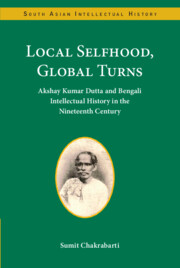 Local Selfhood, Global Turns
Local Selfhood, Global Turns Book contents
- Frontmatter
- Dedication
- Contents
- Acknowledgements
- Note on Transliteration
- Introduction
- 1 The Discontents of Eclecticism: The Milieu of Akshay Kumar Dutta
- 2 The New World of Science: Akshay Kumar Dutta as the ‘Science Worker’
- 3 The Tattwabodhini Period: The Conflicting Contours of Self-Fashioning or Towards a Global History?
- 4 Reconstructing Bengali Selfhood: The Conception of Dharma in Akshay and Bankim
- 5 On the Question of the Public Sphere: Civic Life, Polity, Dissent, and an Affective Engagement with the Janasamaj
- 6 Imagining Bharatvarsha: Identity, History, Nationhood
- Conclusion and Further Thoughts
- Bibliography
- Index
4 - Reconstructing Bengali Selfhood: The Conception of Dharma in Akshay and Bankim
Published online by Cambridge University Press: 30 June 2023
- Frontmatter
- Dedication
- Contents
- Acknowledgements
- Note on Transliteration
- Introduction
- 1 The Discontents of Eclecticism: The Milieu of Akshay Kumar Dutta
- 2 The New World of Science: Akshay Kumar Dutta as the ‘Science Worker’
- 3 The Tattwabodhini Period: The Conflicting Contours of Self-Fashioning or Towards a Global History?
- 4 Reconstructing Bengali Selfhood: The Conception of Dharma in Akshay and Bankim
- 5 On the Question of the Public Sphere: Civic Life, Polity, Dissent, and an Affective Engagement with the Janasamaj
- 6 Imagining Bharatvarsha: Identity, History, Nationhood
- Conclusion and Further Thoughts
- Bibliography
- Index
Summary
History and Bengali Selfhood
The writing of history will always seek out narratives. If one were to look around the cultural, social, religious, or economic tropes scattered across the nineteenth-century Bengali society, it would not be difficult to discover the many reconstructivist narratives that define what may be described as ‘threshold moments’2 in the history of the Bengali people. So many of these narratives employ, implicitly or explicitly, tropes of representation that may be read through lenses of globality, global intellectual history, the world historical, or the universalist, and put into critical categories that bring out differential moments of enunciation which may be interpreted variously. Similarly, while some historians and commentators will tend to read nineteenth-century Bengal as one whole block divided into separate but connected narratives, others would discover a more well-defined disjunction between the first and second parts of the century. Likewise, both the principles of reconstruction and the way the ethos of the Bengali people were interpreted may be seen as different ways of reading history. Or, in other words, different ways of framing a narrative. As I have tried to understand in the last chapter, Akshay Dutta's intervention as both an object and an agent of history involved a rather complicated cultural politics due to his interstitial location within bhadralok Calcutta society, the contingent and unfinished nature of his academic training, and what one might call a certain ideological evasiveness that refused nomenclatures, boundaries, or categories. With time, the debates on representation became more fraught and by the middle of the century, the principles of reconstruction or avenues of representation were complicated by too many interconnections, cross-currents, and hermeneutic challenges that were not easy to grapple with: the modern and non-modern debate; the good and evil of imperialism; the principles of education; nationalism and its manifestations, and the corresponding idea of swadesh; religion, religious practice, and debates on conversion – to name a few. Out of these debates and discussions emerged the question of selfhood, of fashioning the self as a representative body of Bengali (or sometimes national) identity and defined within a moral or cultural register that had a commensurate relationship with modernity.
- Type
- Chapter
- Information
- Local Selfhood, Global TurnsAkshay Kumar Dutta and Bengali Intellectual History in the Nineteenth Century, pp. 123 - 154Publisher: Cambridge University PressPrint publication year: 2024
